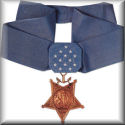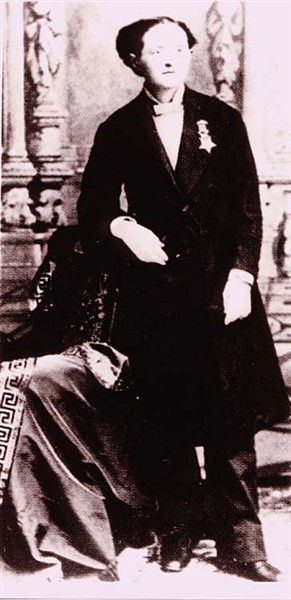
~

Only Woman Medal of Honor Holder Ahead of Her Time


Ann Walker [1832-1919]

By: Rudi Williams
American Forces Press Service
WASHINGTON, April 30, 1999 – Whenever Ann Walker's brattish attitude emerged, her grandmother would often say, "You're just like your great- aunt Mary." "When I was a teen-ager, I started to wonder, who is this great- aunt Mary?" said Walker, 74. "I sort of hungered for information about her, but I couldn't find much. Nobody, including my grandmother, seemed to care about her. She always said, 'Your aunt was always dressing like a man.'"
Her curiosity surged when one of her father's friends, a history professor, told her about her distant relative, actually her great-great-aunt, Dr. Mary Edwards Walker of the Civil War Union Army. He told her Mary Walker was the first American woman to be a military doctor, a prisoner of war and a Medal of Honor recipient. She was also a Union spy and a crusader against tobacco and alcohol.
"He told me she was always imitating men, and if she had dressed like a lady, she would have had a larger role in history," said Walker, a resident of Washington's Georgetown Aged Women's Home. A retired free-lance journalist, Walker said she's working on a book, "Woman of Honor," to tell the story of her aunt's Civil War exploits and her controversial life thereafter.
Through the family friend and research, Ann Walker learned her aunt was born on Nov. 26, 1832, in Oswego County, N.Y., and graduated from Syracuse Medical College in 1855. She married fellow medical student Albert Miller, but declined to take his name. The couple set up a medical practice in Rome, N.Y., but the public wasn't ready to accept a woman physician. The practice and the marriage foundered.
When the Civil War started, the Union Army wouldn't hire women doctors, so Walker volunteered as a nurse in Washington's Patent Office Hospital and treated wounded soldiers at the Battle of Bull Run in Virginia. In 1862, she received an Army contract appointing her as an assistant surgeon with the 52nd Ohio Infantry.
The first woman doctor to serve with the Army Medical Corps, Walker cared for sick and wounded troops in Tennessee at Chickamauga and in Georgia during the Battle of Atlanta.
Confederate troops captured her on April 10, 1864, and held her until the sides exchanged prisoners of war on Aug. 12, 1864. Walker worked the final months of the war at a women's prison in Louisville, Ky., and later at an orphans' asylum in Tennessee. The Army nominated Walker for the Medal of Honor for her wartime service. President Andrew Johnson signed the citation on Nov. 11, 1865, and she received the award on Jan. 24, 1866. Her citation cites her wartime service, but not specifically valor in combat.
Walker's citation reads in part that she "devoted herself with much patriotic zeal to the sick and wounded soldiers, both in the field and hospitals, to the detriment of her own health. She has also endured hardships as a prisoner of war for four months in a Southern prison while acting as contract surgeon."
The War Department, starting in 1916, reviewed all previous Medal of Honor awards with the intent of undoing decades of abuse. At the time, for instance, the medal could be freely copied and sold and legally worn by anyone. Past awards would be rescinded and future ones would be rejected if supporting evidence didn't clearly, convincingly show combat valor above and beyond the call of duty.
Mary Walker and nearly 1,000 past recipients found their medals revoked in the reform. Wearing the medal if unearned became a crime. The Army demanded Walker and the others return their medals. She refused and wore hers until her death at age 87 in 1919.
In the late 1960s, Ann Walker launched an intensive lobbying campaign to restore her aunt's medal. A Nov. 25, 1974, letter from the Senate Veterans Affairs Committee read, in part, "It's clear your great-grandaunt was not only courageous during the term she served as a contract doctor in the Union Army, but also as an outspoken proponent of feminine rights. Both as a doctor and feminist, she was much ahead of her time and, as is usual, she was not regarded kindly by many of her contemporaries. Today she appears prophetic."
President Jimmy Carter restored Mary Walker's Medal of Honor on June 11, 1977. Today, it's on display in the Pentagon's women's corridor.
Walker said her relative was controversial on the battlefield and in civilian life. During the war, she wore trousers under her skirt, a man's uniform jacket and two pistols. As an early women's rights advocate, particularly for dress reform, she was arrested many times after the war for wearing men's clothes, including wing collar, bow tie and top hat.
The Women in Military Service to America Memorial at Arlington (Va.) National Cemetery features the story of Dr. Mary E. Walker along with a photograph of her and her walking cane. Curator Judy Bellafaire called Walker "quite a character," and one whose ideas made her seem eccentric in her own day and age.
"But judging her from today's perspective, much of what she spoke and wrote about, that people made fun of at the time, is probably true today," Bellafaire said. Walker, she said, wrote volumes about the evils of tobacco and alcohol and women's clothes and authored two books: "Unmasked" and "Hit," a fictionalized autobiography. "My most favorite of her sayings is, 'Let the generations know that women in uniform also guaranteed their freedom,'" Ann Walker said. "She was strong. I wish I'd known her. It would have been fun."

Ann Walker


~~
© 2009 USCG Lightship Sailors Association International, Inc.
Rick Gryder webmaster
~
~
~
~